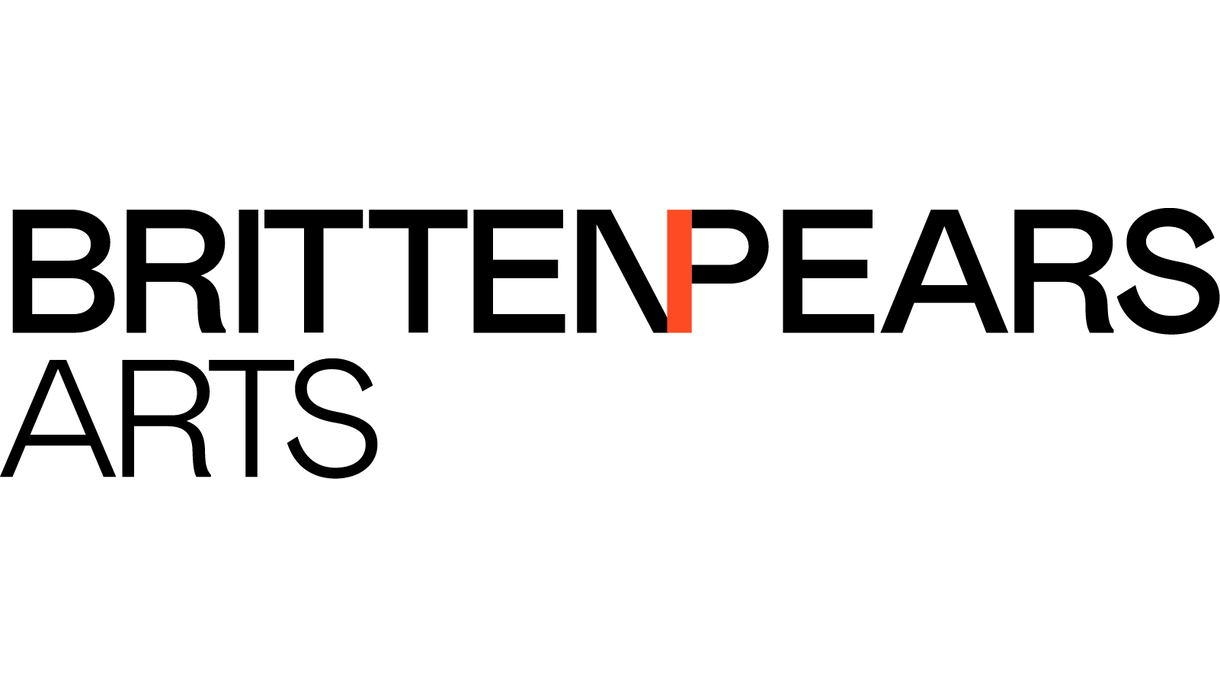Competition Dates
August 25 - 31, 2025
Quartet Applications accepted from October 1, 2024 until March 1, 2025
Competition Information
Overview
The Banff International String Quartet Competition is recognized as one of the premier chamber music competitions in the world. Established in 1983, BISQC is a large celebration of chamber music in a festival format attracting enthusiastic capacity audiences. The unparalleled exposure to concert presenters, managers and broadcasters from North America and abroad makes BISQC a career launching pad for all invited ensembles.
All quartets invited to participate in the competition are provided return transportation from their home to Banff as well as room and board for the duration of BISQC. A separate rehearsal room for each quartet will also be provided.
Prizes
In addition to generous cash prizes, the laureate quartets are offered residency opportunities at Banff Centre and, for the first prize laureates, a custom-designed three-year artistic and career development program which includes touring, a recording residency, the Southern Methodist University Peak Fellowship Ensemble-in-Residence Prize of a paid residency worth $110,000 CAD, an Esterházy Foundation Residency with concerts at Haydn Hall in Eisenstadt and the Lucerne Festival, and an opportunity for a two-week Chamber Music in Residency at the prestigious Britten Pears Arts in England.
Career Development Prizes
In recognition of the extraordinary level of artistry that BISQC attracts, in 2016 a new career development program was introduced which guarantees financial support to all invited quartets. All quartets not advancing to the finals will receive a Christine and David Anderson Prize of $5,000 CAD.
How to Apply
Online applications are accepted between the dates of October 1, 2024, and March 1, 2025.
Applying for BISQC is a 2-step process:
- Complete all Acceptd application questions and upload all support materials
- Pay $250 CAD non-refundable fee through Acceptd in order to complete and submit the application
Applications close March 1, 2025, 23:39 GMT -07:00 (11:59 pm MT)
ALL SUPPORT MATERIAL INCLUDING VIDEOS, MUST BE SUBMITTED BY THIS TIME.
Full details below and in the Rules, Regulations and Repertoire.
Rules, Regulations & Repertoire
Prizes
1st Place Laureates
One quartet will be awarded a custom-designed, three-year artistic and career development program which includes:
• $25,000 CDN cash prize;
• Winner’s Concert Tours in career-building markets in Europe and North America, arranged by Banff Centre;
• A two-week residency at Banff Centre including a recording produced by Banff Centre;
• Coaching, career guidance, and mentorship;
• Southern Methodist University Peak Fellowship Ensemble-in-Residence Prize which includes a one-year paid visiting residency at the Meadows School involving performances, coaching, and mentorship. This residency is valued at over $110,000 CDN.
• A residency with the Esterházy Foundation, including concerts at Haydn Hall in Eisenstadt and the Lucerne Festival.
• An opportunity for a two-week Chamber Music Residency at the prestigious Britten Pears Arts in England
2nd Place Laureates
• $12,000 CDN cash prize;
• A creative residency at Banff Centre including coaching and mentorship opportunities.
3rd Place Laureates
• $8,000 CDN cash prize;
• A creative residency at Banff Centre including coaching and mentorship opportunities.
The R.S. Williams & Sons Haydn Prize:
$4,000 for the best performance of a Haydn quartet from Round 1.
The Canadian Commission World Premiere Prize, in honour of the R.S. Williams & Sons Company:
$4,000 for the best performance in Round 3 of the commissioned quartet by Kati Agócs.
Christine and David Anderson Prizes:
In recognition of the extraordinary level of artistry that BISQC attracts, all quartets not advancing to the finals will receive a $5,000 CAD prize to support their emerging careers.
The DC Anderson Family Foundation in partnership with the Grenadines Initiative
An all-expense paid 10-day residency and outreach opportunity.
Prizes are in Canadian dollars and are subject to relevant Canadian government withholding taxes, with the exception of the Southern Methodist University Peak Residency. Funds for the SMU Residency are paid directly by SMU to the musicians of the winning ensemble and may be subject to United States withholding taxes.
All Prizes will be announced on Sunday August 31, 2025 at the Awards Ceremony following the final round of the competition.
Winner's Tour
All quartets accepted into the competition must agree that if they win first prize, they will perform in the Winner’s Concert Tours arranged for them by BISQC or its designates in January 2026, March 2026, Summer 2026, Fall 2026, Winter 2027, Summer 2027, and Spring or Summer 2028. Concert booking periods will be available to all accepted quartets by April 30, 2025. Any dates added to the tour after this date would need to be mutually agreed upon by the winning quartet.
BISQC does not retain any fees for its management service in arranging the Winner’s Concert Tour but reserves the right to enter into an agreement with other management to secure concert engagements. Concert engagements obtained by BISQC or its designates as part of the first prize will not be subject to any fee payable to the prize-winner’s current or future artist management. In addition, the winning quartet and its current or future artist management agree to give exclusivity within a 100 km radius to Winner’s Concert Tour presenters for the concert season in which the quartet appears.
Should a situation arise where the winning quartet cannot procure the necessary travel documents or visas, or cannot fulfill the concert obligations, BISQC retains the right to transfer the winning prize to the 2nd or 3rd place quartets or a quartet of its choosing.
Should there be a change in personnel in any of the winning quartets after the competition, it must be communicated with BISQC for review. BISQC reserves the right to cancel the quartet’s participation in the winner’s career development program, including any future concert performances.
All competing quartets coming to Banff Centre campus agree to comply with all provincial and Banff Centre mandated health and safety measures.
By agreeing to participate in the 15th BISQC, competing quartets become ambassadors of Banff Centre and the Banff International String Quartet Competition and must conduct themselves in an exemplary manner. BISQC reserves the right to cancel the participation of quartets and/or their members that display inappropriate behavior in advance of or during the competition or during the Winner’s Concert Tour and Career Development period. Quartets will be required to sign a Code of Conduct as part of the application process and winners will have a Code of Conduct included in their Career Development contract.
MKI Artists and Konzertdirektion Hampl will oversee and manage the extensive touring of North America and Europe as part of the 2025 first prize winner’s tour
Eligibility
The competition is open to string quartets of all nationalities whose members are each under the age of 35 as of September 1, 2025 (born on or after September 1, 1990).
First and second prize winners of any previous Banff International String Quartet Competition (BISQC) are ineligible to apply. For the purposes of this rule, this includes quartets and individual members of quartets.
Quartets that have already competed twice in BISQC are ineligible to apply. For the purposes of this rule, a quartet will be considered the same group if 50 percent of the personnel are returning.
Application Process
All applying quartets will submit materials and fee via the BISQC Acceptd online application platform. This includes:
- Complete all application questions on the Acceptd portal - https://app.getacceptd.com/banff
- Pay a non-refundable application fee of $250 CAD
- Resume of the quartet's history including repertoire list and performance history for the period covering January 2022 to October 2024
- Two professional quality high-resolution format (minimum 300 DPI) colour photographs, one in landscape orientation and one in portrait orientation, including photo credit details
- A brief description of each member's training and experience
- Proof of date of birth for each quartet member (e.g. copy of valid passport or birth certificate)
- Two recommendations to be submitted directly by the recommenders via Acceptd
- Three videos* (one per work) recorded after January 1, 2024. The three videos will contain:
1. Two contrasting movements of a quartet by Franz Joseph Haydn from Opus 20, 33, 42, 50, 54, 55, 64, 71, 74, 76, 77;
OR
Two contrasting movements from one of the ten celebrated W.A. Mozart quartets (K. 387, K. 421, K. 428, K. 458, K. 464, K. 465, K. 499, K. 575, K, 589, K, 590);
OR
Two contrasting movements from one of Ludwig van Beethoven’s Opus 18 quartets.
2. First movement from a quartet from the romantic or nationalist repertoire of the 19th century, or the Debussy Quartet, Op. 10, or the Ravel Quartet, or the Elgar Quartet, Op. 83, or Sibelius Quartet "Voces intimae", Op. 56. Quartets by Schubert or Beethoven will not be accepted in this round.
3. One complete quartet from the following list:
• Béla Bartók: String Quartet No. 1 through No. 6
• Alban Berg: Lyric Suite or String Quartet Op. 3
• Benjamin Britten: String Quartet No. 1, Op. 25; or No 2, Op. 36; or No. 3, Op. 94
• Henri Dutilleux: Ainsi la nuit
• Alberto Ginastera: String Quartet No. 1, Op. 20 or No. 2, Op. 26
• Paul Hindemith: String Quartet No. 4, Op. 22 or No. 5, Op. 32
• Leoš Janáček: String Quartet No. 1, “Kreutzer Sonata” or No. 2, “Intimate Letters”
• György Ligeti: String Quartet No. 1 or No. 2
• Ruth Crawford Seeger: String Quartet
• Arnold Schoenberg: String Quartet No. 3, Op. 30 or No. 4, Op. 37
• Dmitri Shostakovich: String Quartet in F Major, No. 3, Op. 73; or in B flat Major, No. 5, Op. 92; or in E flat Major, No. 9, Op. 117
• Mieczysław Weinberg: String Quartet No.1 through No. 17
• Alexander Zemlinsky: String Quartet No. 3, Op. 19 or No. 4, Op. 25
*The videos must be of professional quality, shot by a single stationary camera in real-time, and must not be edited or altered in any way. You can record movements individually if preferred – you do not need to record multi-movement works in one take, but separate recordings of multi-movement works need to take place in the same location. Audio editing is strictly forbidden. Subtle audio processing (eg. reverb and equalization) may be used, as long as a natural impression of the ensemble is maintained. BISQC reserves the right to disqualify edited recordings or recordings that are not of professional quality. Physical DVDs or CDs, or digital audio recordings will NOT be accepted. Applicants must use the Acceptd online application tool.
Online applications, together with all supporting documents and the application fee, must be submitted between the dates of October 1, 2024 and March 1, 2025. All application materials must be received by March 1, 2025 (23:59 GDT-07:00).
Jury and Selection Process
- All applications will be pre-screened by BISQC prior to the preliminary jury adjudication process. Any application not meeting the highest standards will not be forwarded to the preliminary jury for consideration.
- The three preliminary jury members will review all submitted materials and select no more than 10 quartets to attend the competition.
- Quartets selected for the 15th BISQC will be advised no later than April 30, 2025, by email and phone.
- The quartets selected to participate in BISQC are strongly encouraged to arrive in Banff on Friday, August 22, 2025, but may travel on Saturday, August 23, 2025 as long as they arrive in Banff no later than 4pm. All competing quartets must remain on site through to departure on Monday, September 1, 2025.
- Selected Quartets shall not communicate with jury members during the competition, nor shall any other person communicate with the jury members on behalf of any competitor. Violation of this rule may result in automatic disqualification from the competition.
- The preliminary jury (3) and competition jury (7) will adjudicate the selected competing quartets using voting procedures prepared by BISQC’s official mathematician. The decisions of the preliminary jury and competition jury shall be final, and no correspondence will be entered into regarding the decisions of either group.
Competition Repertoire & Format
The quartet’s selected repertoire for performance during the competition may include the works presented during the application phase.
Each quartet invited to BISQC will perform in the first four rounds and if selected, will perform a fifth time during the Final Round.
The competition format and required repertoire is as follows:
ROUND 1: 21st Century Haydn
Quartets will perform a complete work by Franz Joseph Haydn, as well as a complete quartet written on or after January 1, 2000. Total performance time of no more than 50 minutes. Time requirements of this round should be strictly observed.
Haydn Selections:
• Franz Joseph Haydn: String Quartet, Op. 20, No. 1, 2, 3, 4, 5 or 6
• Franz Joseph Haydn: String Quartet, Op. 33, No. 1, 2, 3, 4, 5 or 6
• Franz Joseph Haydn: String Quartet, Op. 42, No. 35
• Franz Joseph Haydn: String Quartet, Op. 50, No. 1, 2, 3, 4, 5 or 6
• Franz Joseph Haydn: String Quartet, Op. 54, No. 1, 2 or 3
• Franz Joseph Haydn: String Quartet, Op. 55, No. 1, 2 or 3
• Franz Joseph Haydn: String Quartet, Op. 64, No. 1, 2, 3, 4, 5 or 6
• Franz Joseph Haydn: String Quartet, Op. 71, No. 1, 2 or 3
• Franz Joseph Haydn: String Quartet, Op. 74, No. 1, 2 or 3
• Franz Joseph Haydn: String Quartet, Op. 76, No. 1, 2, 3, 4, 5 or 6
• Franz Joseph Haydn: String Quartet, Op. 77, No. 1 or 2
ROUND 2: Romantic
Quartets will perform a complete quartet from the romantic or nationalist repertoire of the 19th century, or the Debussy Quartet, Op. 10, or the Ravel Quartet, or the Elgar Quartet, Op. 83, or Sibelius Quartet "Voces intimae", Op. 56. Quartets by Schubert or Beethoven will not be accepted in this round.
ROUND 3: Kati Agócs World Premiere
Quartets will perform a new quartet of approximately 9 minutes in length by Canadian composer Kati Agócs. The work will be available to quartets that successfully pass the preliminary screening round and accept the invitation to participate in the 15th BISQC. Score and parts will be sent to the competing quartets by June 4, 2025.
ROUND 4: Beethoven/Schubert + 20th Century
Quartets will perform the first movement of a Ludwig van Beethoven Op. 59 work OR the first movement of a Franz Schubert late work from the list below, PLUS one complete work from the 20th century list below:
Schubert Selections:
• Franz Schubert String Quartet No. 13, D. 804 (Rosamunde) 1st movement: Allegro ma non troppo
• Franz Schubert String Quartet No. 14, D. 810 (Death and the Maiden) 1st movement: Allegro
• Franz Schubert String Quartet No. 15, D. 887 1st movement: Allegro molto moderato
20th Century Selections:
• Béla Bartók: String Quartet No. 1 through No. 6
• Alban Berg: Lyric Suite or String Quartet Op. 3
• Benjamin Britten: String Quartet No. 1, Op. 25; or No 2, Op. 36; or No. 3, Op. 94
• Henri Dutilleux: Ainsi la nuit
• Alberto Ginastera: String Quartet No. 1, Op. 20 or No. 2, Op. 26
• Paul Hindemith: String Quartet No. 4, Op. 22 or No. 5, Op. 32
• Leoš Janáček: String Quartet No. 1, “Kreutzer Sonata” or No. 2, “Intimate Letters”
• György Ligeti: String Quartet No. 1 or No. 2
• Ruth Crawford Seeger: String Quartet
• Arnold Schoenberg: String Quartet No. 3, Op. 30 or No. 4, Op. 37
• Dmitri Shostakovich: String Quartet in F Major, No. 3, Op. 73; or in B flat Major, No. 5, Op. 92; or in E flat Major, No. 9, Op. 117
• Mieczysław Weinberg: String Quartet No.1 through No. 17
• Alexander Zemlinsky: String Quartet No. 3, Op. 19 or No. 4, Op. 25
Following the Beethoven/Schubert + 20th Century Round, the jury will select three quartets to advance to the fifth and Final Round.
ROUND 5: Finals
Each finalist quartet will present a program of not more than 45 minutes of music. The program must contain music by a minimum of three different composers. Individual movements of larger works are permitted, but the excerpts of movements are not allowed. No music performed in rounds prior to finals can be repeated in the final round. The program is intended as an opportunity to demonstrate both excellence in performance and skill in curating. Time requirements of this round should be strictly observed.
- Each quartet will submit a written description of the thought behind the chosen program. The written description should provide the listener, both audience and jurors, insight into the ideas behind the works. Why these works? What are you exploring or illuminating by the selections?
- As the winning quartet will be expected to work with many presenting organizations on programming, this round provides an opportunity to demonstrate their interest and thoughtfulness in creative curating.
- The finalists are welcome to program repertoire around a thematic idea that they choose, but a specific theme is not required.
- The written narrative describing the program can be submitted in English or in another language. Any submissions not in English will be professionally translated by the competition and the English translation will be shared with the jury and public. The submission should be no more than 750 words.
If accepted to compete in the 15th BISQC, competitors will be advised, prior to arrival in Banff, as to which repeats will be accepted and which repeats must be omitted during performances.
The works from the repertoire list as stated on the application form will be the repertoire performed during the competition. No other work may be substituted without prior written approval of the BISQC Director.
Any quartet that has competed in a previous Banff International String Quartet Competition cannot present any of the same repertoire they performed for the public and jury in any previous BISQC.
Quartets are free to perform standing or sitting in any formation.
All performances take place in the Jenny Belzberg Theatre at Banff Centre for Arts and Creativity.
Practical Information
BISQC will provide the following to all invited quartets:
- Return economy airfare from the quartet’s home base to the Calgary International Airport (including cello seat).
- Return ground transportation to the Banff Centre from the Calgary International Airport.
- Accommodation on Banff Centre campus from Friday, August 22 to Monday, September 1, 2025 (check-out Monday, September 1, 2025). Earlier arrival, if deemed necessary due to flight arrival times, is subject to availability of accommodation. Accommodation will be double occupation between quartet members when appropriate, or single rooms on request.
- All meals from Friday, August 22 through Monday, September 1, 2025.
- A separate rehearsal room for each quartet.
Obtaining appropriate travel documents and insurance is the sole responsibility of each competitor. BISQC accepts no liability of any kind whatsoever for any personal illness or injury sustained by the competitor or for loss or damage to a competitor’s belongings, including instrument, during transit or while at the competition.
Under no circumstances will a change of personnel between the application process and the end of the competition in Banff be permitted.
BISQC has the right, without payment of any fee, to record, videotape, film, broadcast, or photograph any competition concerts or events for any purpose. All rights, including copyright in such media shall vest in and be owned by BISQC in perpetuity.
BISQC has the right to produce and distribute without limit or payment of any fee, audio and/or video recordings of all competition concerts or events in whole or in part.
The official language of the competition is English.
If there is discrepancy between the BISQC website, Acceptd, and the Rules, Regulations, and Repertoire document, the document shall be deemed correct. At its discretion, BISQC reserves the right to clarify these rules and update as necessary. Please contact the BISQC office regarding any discrepancies.
Preliminary Jury
Ayane Kozasa
Aizuri Quartet / Kronos Quartet
Hailed for her "magnetic, wide-ranging tone" and her "rock solid technique" (Philadelphia Inquirer), violist Ayane Kozasa is a sought-after chamber musician, collaborator, and educator. Since winning the 2011 Primrose International Viola Competition—where she also captured awards for best chamber music and commissioned work performances—Ayane has appeared on stages across the world, from Carnegie, Wigmore, and Suntory Hall to Ravinia, Aspen, and the Marlboro Music Festival. She is a passionate advocate for the expansion of viola repertoire, and has commissioned multiple new works featuring the viola, including “American Haiku” by Paul Wiancko and “K’Zohar Harakia” by Judd Greenstein.
Ayane has developed a career that revolves around the art of chamber music. She is currently a member of the duo Ayane & Paul with composer and cellist Paul Wiancko, with whom she collaborated on Norah Jones’ album “Pick Me Up Off the Floor.” The duo has appeared at several festivals, including Spoleto Festival USA, Brooklyn Chamber Music Society, and the St. Lawrence String Quartet Seminar. Ayane’s most recent passion project Owls is a quartet collective with violinist Alexi Kenney and cellists Gabriel Cabezas and Paul Wiancko. Owls share an uncommonly fierce creative spirit, weaving together new compositions with original arrangements of music ranging from the 1600s to the present, and have played at series such as the Baryshnikov Arts Center in NYC and The Phillips Collection in Washington, D.C. This season, Ayane is the guest violist of the Cavani String Quartet. The quartet boasts several original educational presentations with the string quartet as the catalyst, and they have presented their work at institutions such as the Cleveland State University and the University of Michigan. Beginning fall of 2024, Ayane joins the Kronos Quartet as their new violist.
As a founding member of the Aizuri Quartet for 11 years, she developed her skills of launching a brand new ensemble. The quartet was the 2018 quartet-in-residence at the Metropolitan Museum and the grand prize winners of both the Osaka International String Quartet Competition and MPrize Chamber Arts Competition. The Aizuri Quartet’s debut album, Blueprinting—which features the music of 5 American composers, all commissioned by the quartet—was nominated for a Grammy Award and named one of NPR’s top 10 classical albums of 2018. With collaboration being a deep part of their identity, they performed with artists such as Wilco, Marcy Rosen, Jonathan Biss, and Maeve Gilchrist. Their devotion to education brought them to young musicians around the world, and they crafted a unique student composer workshop format that they implemented at institutions such as the University of Southern California, Princeton University, and New York Youth Symphony. In 2020, the quartet launched AizuriKids, an interactive web series for children that explores relationships between music and themes ranging from astrophysics to cooking. Their dedication to the art of the string quartet for 11 years was recognized by Chamber Music America, and in 2022 the quartet received the Cleveland Quartet Award.
Other collaboration highlights include performances with world-renowned artists such as Tessa Lark, Steven Banks, Nobuko Imai, and the Kronos Quartet. As a seasoned orchestral performer, Ayane has performed with the Orpheus Chamber Orchestra, A Far Cry, Philadelphia Orchestra, East Coast Chamber Orchestra, the Saint Paul Chamber Orchestra, as well as the Chamber Orchestra of Philadelphia, where she served as principal violist from 2012 to 2016.
Much of Ayane’s current work involves mentoring aspiring young musicians through programs like the Meadowmount School of Music, Green Lake Chamber Music Camp, and the St. Lawrence String Quartet Chamber Music Seminar. She is currently on the viola faculty at the University of Cincinnati College-Conservatory of Music and has been guest faculty at the San Francisco Conservatory of Music and Northwestern University. Taking inspiration from her mentors the Cavani Quartet, Ayane has developed several education-based music shows curated especially for the youth in a festival’s community including Caramoor Center for Music and the Arts and Spoleto Festival USA. Ayane is a graduate of the Curtis Institute of Music, the Kronberg Academy in Germany, and the Cleveland Institute of Music, where she studied viola with Misha Amory, Roberto Díaz, Nobuko Imai, and Kirsten Docter. Aside from music, she enjoys hiking, doodling, and creating animation.
Photo by Shervin Lainez
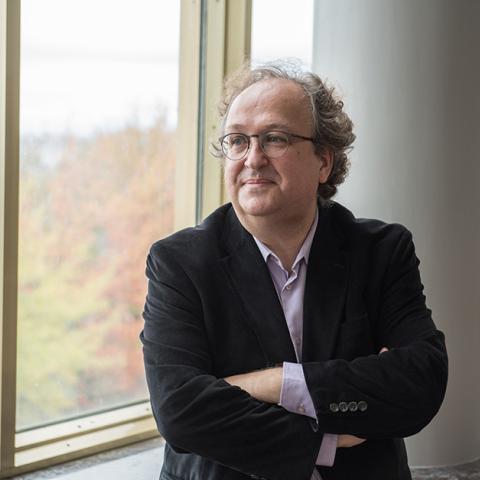

Guillaume Sutre
Ysaÿe Quartet
Guillaume Sutre was only eighteen years old when he won the Alberto Curci International Violin Competition in Naples, Italy and the International Piano Trio ARD Competition in Munich. The list quickly fills out with a first prize at the European Chamber Music Competition FNAPEC (1989), first prize at the Fischoff Chamber Music Competition (USA 1990), winner of the Prix de la Fondation Charles Oulmont (1989), first prize at the Lily Laskine Competition (1991) and winner of the Prix Georges Enesco de la SACEM (1994). In 1999, he was named Chevalier of the Order of Arts and Letters by the French government.
Mr. Sutre was attracted to chamber music early in his career. In 1986, he founded the Trio Wanderer; ten years later he became the first violinist of the Ysaÿe Quartet, a post he held for almost twenty years until their farewell concert in 2014 in Paris’ Cité de la Musique. His vast repertoire of over 600 works features all the string chamber music of Beethoven, Brahms, Schumann, all Mozart Violin sonatas and all 68 Haydn quartets. He has performed at many of the most prestigious venues around the world, Carnegie Hall in New York, Philadelphia PCMS, Washington Library of Congress, Jerusalem YMCA, Théâtre des Champs-Elysées in Paris, Rencontres Musicales d’Evian, La Roque d'Anthéron, Les Grandes Heures in Saint-Emilion, Berlin Philharmonie, Herkulessaal in München, Mozarteum in Salzburg, Wigmore Hall in London, Musikverein in Vienna, Concertgebouw in Amsterdam, Teatro della Pergola in Florence, Milano Società del Quartetto, Teatro di San Carlo in Napoli, Lisbon Gulbenkian Foundation, Bilbao Sociedad Filarmónica, Zurich Tonhalle, Addis Abeba Music School, Amazon Theatre in Manaus, Hanoi Opera House, with such performers as Gautier Capuçon, Renaud Capuçon, Gérard Caussé, Ana Chumachenco, Valentin Erben, Nelson Freire, Lynn Harrell, Frans Helmerson, Gary Hoffman, Leonidas Kavakos, Martin Lovett, Yo-Yo Ma, Sabine Meyer, Enrico Pace, Jean-Claude Pennetier, Jean-Bernard Pommier, Michel Portal, Pascal Rogé, Janos Starker. With his wife Kyunghee Kim-Sutre, they form a violin and harp duo and continue to explore and enrich the existing repertoire for this group, conducting extensive research in music libraries around the world while commissioning works from young composers.
In addition to his activity as a chamber musician, he also plays as a soloist with the Sinfonia Varsovia, Berlin RIAS Orchestra, Göttingen Symphony Orchestra, RAI Orchestra in Napoli, Franz Liszt Orchestra of Budapest, Ensemble Orchestral de Paris, Orchestre Philharmonique de Radio-France, Orchestre National de Montpellier, Orchestre National d'Auvergne, Orchestre National de Bretagne, Orchestre Philharmonique Royal (Liège) and with conductors such as Christophe Coin, Jean-Jacques Kantorow, Sir Yehudi Menuhin, Sheldon Morgenstern, David Robertson, Stefan Sanderling, Arie Van Beek.
His recordings for Sony Classical, Decca, Harmonia Mundi, Naïve, Aeon, Ysaÿe Records, Hortus and Sonarti have received the highest distinctions in France and internationally. His live recording of the complete duets of Haydn and Mozart with violist Miguel da Silva has been hailed by critics as definitive, his CD featuring the quartets of A. Boucourechliev was awarded the Charles Cros Academy’s Grand Prix du Disque, and his two recent albums, J. Woelfl: The Paris Years (Sonarti) and Pensés Intimes (Hortus / WWI), received the 5 of Diapason.
Before joining the Faculty of Music of the University of Montreal in 2021, he was professor of a string quartet class at the Conservatoire à Rayonnement Régional de Paris, professor of violin and director of chamber music for strings at the UCLA Herb Alpert School of Music in Los Angeles, and was part of the inaugural faculty of The Tianjin Juilliard School in China. He has taught master classes at Juilliard, IU Bloomington Jacobs School of Music, San Francisco Conservatory of Music, University of South California, Oberlin Conservatory of Music, McGill Schulich School of Music, Jerusalem Music Center, Royal Conservatoire of Scotland, Aldeburgh Britten-Pears Foundation, Zeister Muziekdagen, Festival Internacional de Inverno in Campos do Jordão, Seoul National University, Villecroze Musical Academy.
Mr. Sutre is passionately committed to imparting his knowledge upon musicians of younger generations. He regularly performs with his students and in 2014 he co-produced the Calidore Quartet's debut CD. He regularly serves on juries of prestigious competitions, such as the Long-Thibaud International Violin Competition in Paris, the A. Postacchini International Violin Competition in Italy and the International String Quartet Competition in Bordeaux.
Guillaume Sutre began his studies in Douai, France; he then entered the Conservatoire National Supérieur de Musique de Paris at age fourteen with Gérard Poulet and Jean-Claude Pennetier. After finishing his studies in France, he attended Indiana University at Bloomington to study with Josef Gingold, Franco Gulli, Menahem Pressler and Janos Starker. He subsequently studied in Cologne with the Amadeus Quartet.
Photo by Amelie Philiberte
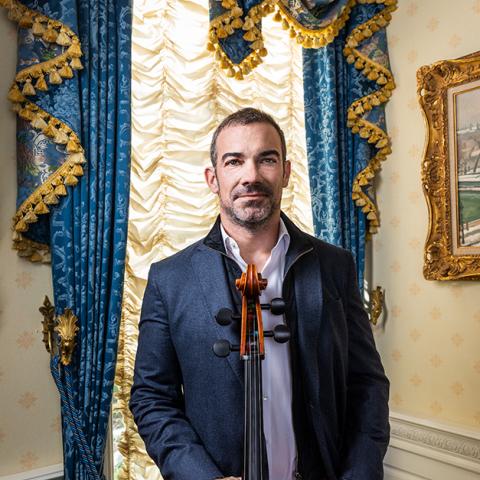

Joshua Gindele
Miró Quartet
Cellist Joshua Gindele, a founding member of the Miró Quartet, began his cello studies at the age of 3 playing a viola his teacher had fitted with an endpin. As cellist for the Miró, Josh has taken first prizes at several national and international competitions including the Banff International String Quartet Competition and the Naumburg Chamber Music Competition. In 2005, the Miró Quartet became the first ensemble ever to be awarded the coveted Avery Fisher Career Grant.
He has shared the stage with some of the classical worlds most renowned artists including Yo-Yo Ma, The New York Philharmonic, Pinchas Zuckerman, Joshua Bell, Midori, Andre Watts and Menahem Pressler. He continues to perform across four continents and on some of the world's most prestigious concert stages.
In 2006 Joshua co‐founded www.classicallounge.com. This is an online networking site where you can meet musicians, both professional and amateur, discover new talent or get discovered, share music, post and get concert information, share opinions, post classified ads and much more. The site was sold to www.classicalconnection.com in August of 2009.
Deeply committed to music education, the Miró has been the Faculty String Quartet-in-Residence at the Sarah and Ernest Butler School of Music at the University of Texas at Austin since 2003 and he maintains an active studio of cellists as a professor there.
An active gym rat and tennis player, Josh and his wife, Rebecca Gindele, have a son and daughter, George and Nora.
More information can be found at: miroquartet.com and music.utexas.edu/about/people/gindele-joshua
Photo by Jeff Wilson
Competition Jury
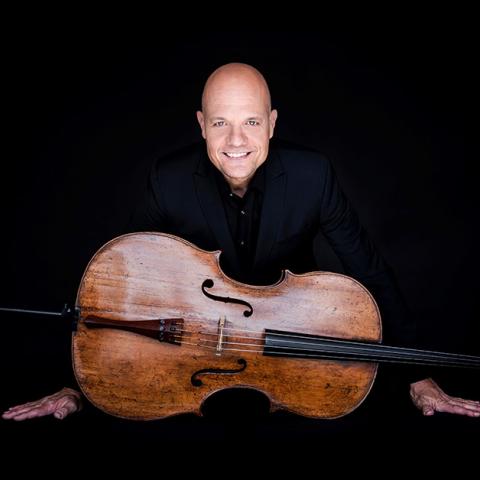

Eckart Runge
Artemis Quartet
As a founding member he marked the characteristic profile of the internationally acclaimed Artemis Quartet throughout three decades. In 2019 Eckart Runge decided to endeavour for new artistic challenges.
Prestigious concert series such as ‘Glocke’ Bremen (2021-24), BASF Ludwigshafen (2022/23) and Carinthischer Sommer (2024) have appointed him Artist in Residence.
His first solo-album was released in 2020 with the radio orchestra Berlin (RSB), featuring the world premiere recording of Nikolai Kapustin’s jazzy cello concerto op. 85 was awarded the prestigious ‘Prize of German Music Critics’.
Since 26 years, his Duo Runge&Ammon performs in international festivals, series and clubs alike. In 2021 the Duo released a new album ‘Revolutionary Icons’ (Berlin Classics), exploring Beethoven in the reflexion of iconic rock-pop-jazz like Jimi Hendrix, Frank Zappa and Miles Davis. Their juxtaposition of baroque and jazzy music ‘Baroque in Blue’ (2023) was hailed by the press. In 2025 the duo’s Album ‘Opium’ reflecting freedom and creativity between the two world wars, but also its shadow of catastrophy, and its referral to our present decade.
Eckart Runge studied with David Geringas in Lübeck and the Alban Berg Quartet in Vienna. Further artistic inspirations include Lynn Harrell, Alfred Brendel, Walter Levin and György Kurtag. Several awards in international competitions in Cremona, Geneva and Munich initiated his international career on stage.
Eckart Runge held professorships at the University of Arts in Berlin and the Chapelle de la Reine Elisabeth in Brussels. In 2023 he was appointed professor for chamber music at the Robert Schumann Hochschule in Düsseldorf.
Photo by Nada Navaee
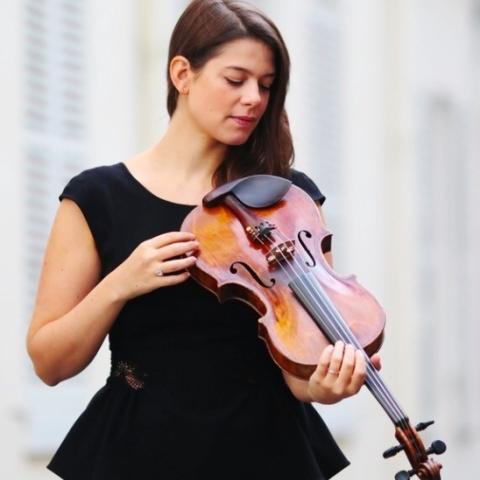

Marie Chilemme
Quatuor Cavatine / Quatuor Ebène
Marie Chilemme was born in Toulouse, France and began playing the viola at the age of three. In 2005 she was admitted to the CNSM of Paris, to study with Jean Sulem. Each year from 2008 to 2013 she was selected for The Academy Ozawa in Switzerland (IMAS), where she received coaching from Paméla Franck, Robert Mann, Sadao Arada, Nobuko Imai and Seiji Ozawa. In 2010, she obtained her Master’s degree from the CNSM of Paris. Next, Marie attended the Hochschule Hanns Eisler of Berlin in Tabea Zimmermann class as well as being admitted to String Quartet's Class of the Artemis Quartet. In 2012, Marie and her brother formed Quatuor Cavatine, winning prizes at two prestigious competitions, the International Competition of Chamber music of Hamburg and the 2nd Prize at the Banff International String Quartet, in Canada. Marie was then admitted to the Queen Elisabeth Music Chapel in Brussels as a resident in the Viola Class of Miguel Da Silva. In October 2017, she joined the Quatuor Ébène. In January 2021, the quartet was commissioned by the University of Music and Performing Arts in Munich to establish a string quartet class as part of the newly founded Quatuor Ébène Academy. Marie plays on ‘the Gibson’ 1734 Stradivari, an exceptionally generous loan from the Stradivari Foundation Habisreutinger.
Photo by Natacha Colmez
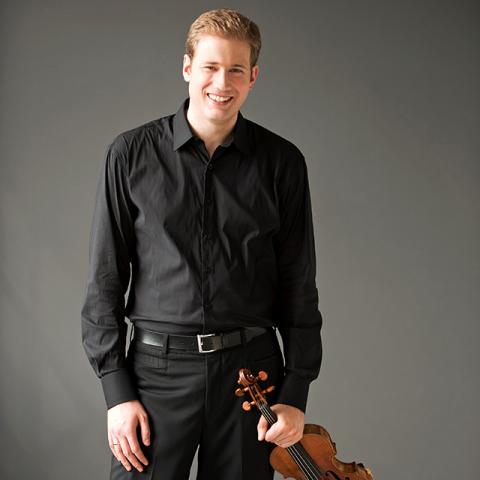

Jonathan Crow
New Orford String Quartet
One of Canada’s brightest talents, violinist Jonathan Crow exudes “masterful coolness” (The Montreal Gazette) as concertmaster of the Toronto Symphony Orchestra. Jonathan earned his Bachelor of Music in Honours Performance from McGill University, at which time he joined the Orchestre Symphonique de Montréal as Associate Principal Second Violin. Between 2002 and 2006, Jonathan was engaged as Concertmaster of that symphony, and notably during his tenure, was the youngest concertmaster of a major North American orchestra. In 2011 he was appointed Concertmaster of the Toronto Symphony Orchestra. Jonathan continues to perform as guest concertmaster with orchestras around the world, including the National Arts Centre Orchestra, Pittsburgh Symphony, Mahler Chamber Orchestra, Filarmonia de Lanaudiere and Pernambuco Festival Orchestra (Brazil). Jonathan has also performed as a soloist with most major Canadian orchestras including the Montréal, Toronto and Vancouver Symphony Orchestras, the National Arts Centre and Calgary Philharmonic Orchestras, the Victoria, Nova Scotia and Kingston Symphonies, and Orchestra London, under the baton of such conductors as Charles Dutoit, Sir Yehudi Menuhin, Gustavo Gimeno, Sir Andrew Davis, Peter Oundjian, Kent Nagano, Mario Bernardi and João Carlos Martins.
Jonathan joined the Schulich School of Music at McGill University as an Assistant Professor of Violin and was appointed Associate Professor of Violin in 2010. Current and former students of Mr. Crow have received prizes at competitions around the world, including the Menuhin International Violin Competition, Montreal Symphony Orchestra Competition, Shean Competition, CBC Radio's NEXT competition, Eckhardt-Grammatte Competition, Canadian Music Competition, and Stulberg International String Competition, and work regularly with orchestras such as the National Arts Centre Orchestra, Toronto Symphony Orchestra, Orchestre Symphonique de Montréal, Camerata Salzburg, Konzerthausorchester Berlin, Verbier Chamber Orchestra, Vienna Kammerphilharmonie and Vienna Symphony Orchestra. Jonathan is currently Associate Professor of Violin at the University of Toronto.
In 2016 Jonathan was named Artistic Director of Toronto Summer Music, which has enjoyed record attendance and rave reviews in all of his first six seasons. An avid chamber musician, he has performed at chamber music festivals throughout North America, South America and Europe including the Banff, Ravinia, Orford, Domaine Forget, Seattle, Montreal, Ottawa, Incontri in Terra di Sienna, Alpenglow, Festival Vancouver, Pernambuco (Brazil), Giverny (France) and Strings in the Mountains festivals. He is a founding member of the Juno Award-winning New Orford String Quartet, a project-based new ensemble dedicated to the promotion of standard and Canadian string quartet repertoire throughout North America. As an advocate of contemporary music he has premiered works by Canadian composers Michael Conway Baker, Eldon Rathburn, Barrie Cabena, Gary Kulesha, Tim Brady, Francois Dompierre, Vivian Fung, Ana Sokolovic, Marjan Mozetich, Christos Hatzis, Ernest MacMillan and Healey Willan. He also includes in his repertoire major concerti by such modern composers as Ligeti, Schnittke, Bernstein, Brian Cherney, Rodney Sharman, Vivian Fung and Cameron Wilson.
Jonathan has recorded for ATMA, Bridge, CBC, Oxingale, Skylark, and XXI-21 labels and is heard frequently on Chaîne Culturelle of Radio-Canada, CBC Radio Two, and National Public Radio, along with Radio France, Deutsche Welle, Hessischer Rundfunk and the RAI in Europe. One of Canada’s brightest talents, violinist Jonathan Crow exudes “masterful coolness” (The Montreal Gazette) as concertmaster of the Toronto Symphony Orchestra. A native of Prince George (British-Columbia), Jonathan earned his Bachelor of Music in Honours Performance from McGill University in 1998, at which time he joined the Montreal Symphony Orchestra as Associate Principal Second Violin. Between 2002 and 2006, Jonathan was the Concertmaster of the Montreal Symphony Orchestra, becoming the youngest concertmaster of a major North American orchestra. Jonathan continues to perform as guest concertmaster with orchestras around the world, including the National Arts Centre Orchestra, Pittsburgh Symphony Orchestra, Mahler Chamber Orchestra, Filarmonia de Lanaudière and Pernambuco Festival Orchestra (Brazil).
Jonathan has performed as a soloist with most major Canadian orchestras including the Montreal, Toronto and Vancouver Symphony Orchestras, the National Arts Centre and Calgary Philharmonic Orchestras, the Victoria and Kingston Symphonies and Orchestra London, under the baton of such conductors as Charles Dutoit, Sir Yehudi Menuhin, Sir Andrew Davis, Peter Oundjian, Gustavo Gimeno, Kent Nagano, Mario Bernardi and João Carlos Martins.
An avid chamber musician, Jonathan has performed at many chamber music festivals in Europe and North America, and is the Artistic Director of Toronto Summer Music. He is a founding member of the Juno Award-winning New Orford String Quartet, a new project-based ensemble dedicated to the promotion of standard and Canadian string quartet repertoire. Jonathan is currently Associate Professor of Violin at the University of Toronto.
Photo by Sian Richards
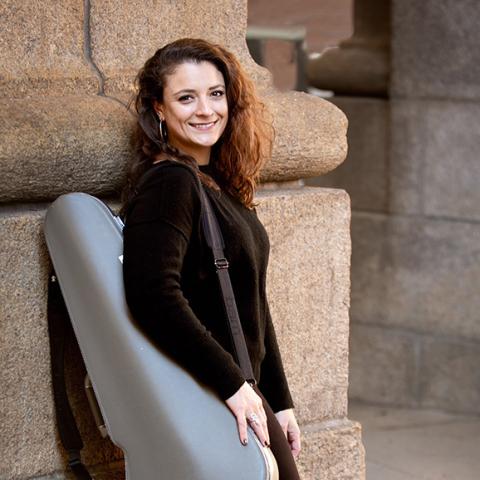

Milena Pajaro-van de Stadt
Dover Quartet
Praised by Strad magazine as having "lyricism that stood out...a silky tone and beautiful, supple lines," Milena Pajaro-van de Stadt has established herself as one of the most sought-after violists of her generation. In addition to appearances as soloist with the New York String Orchestra at Carnegie Hall, theTokyo Philharmonic, the Jacksonville Symphony, the Sphinx Chamber Orchestra, and Symphony in C, she has performed in recitals and chamber-music concerts throughout the United States, Latin America, Europe and Asia, including an acclaimed 2011 debut recital at London’s Wigmore Hall, which was described in Strad as being "fleet and energetic...powerful and focused."
Ms. Pajaro-van de Stadt was the founding violist of the twice-Grammy-nominated Dover Quartet, and played in the group from 2008-2022. During her time in the group, the Dover Quartet was the First Prize-winner and recipient of every special award at the Banff International String Quartet Competition 2013, and winner of the Gold Medal and Grand Prize in the 2010 Fischoff Chamber Music Competition. Also during her tenure, the Dover Quartet received the Cleveland Quartet Award and an Avery Fisher Career Grant. Her numerous awards also include First Prize at the Lionel Tertis International Viola Competition and top prizes at the the Sphinx Competition and the Tokyo International Viola Competition. While in the Dover Quartet, Ms. Pajaro-van de Stadt was on the faculty at The Curtis Institute of Music and Northwestern University’s Bienen School of Music, and a part of the Quartet in Residence of the Kennedy Center in Washington, D.C. She is now a member of the newly formed piano quartet “Espressivo!” along with acclaimed artists Jaime Laredo, Sharon Robinson, and Anna Polonsky.
Photo by Eva Ravel Photography
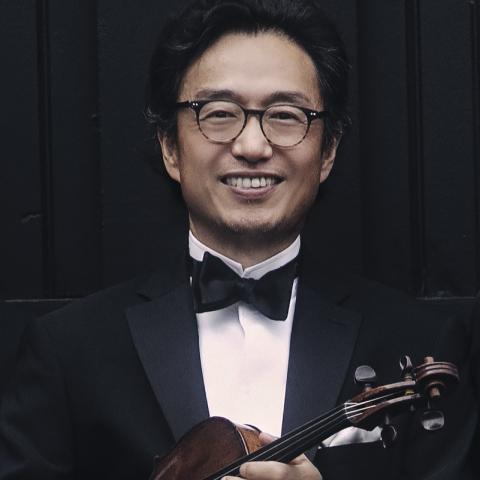

Honggang Li
Shanghai Quartet
Honggang Li is a founding member of the Shanghai Quartet, which is now in its 38th season and has performed nearly 3,000 concerts in 35 countries and recorded over 30 albums.
Mr. Li began studying the violin with his parents at age seven. When the Central Conservatory of Music in Beijing reopened in 1977 after the Cultural Revolution, Mr. Li was selected to attend from a group of over five hundred applicants. Among his teachers were Li-Na Yu and Shmuel Ashkenasi.
He co-founded the Shanghai Quartet with his brother while studying at the Shanghai Conservatory. The ensemble soon became the first Chinese quartet to win a major international chamber music competition (the London International). Mr. Li received a master’s degree from North Illinois University and served as a teaching assistant at The Juilliard School in New York. In 1987, he won the special prize (a 1757 DeCable violin) given by Elisa Pegreffi of the Quartetto Italiano at the First Paolo Borciani International Quartet Competition in Italy.
Mr. Li started his teaching career at the Shanghai Conservatory of Music in 1984. He is currently an Artist-in-Residence and faculty member at the Montclair State University. He also is a resident faculty member at the recently opened Tianjin Juilliard School and viola professor at the Bard Conservatory. He has been a guest professor of both the Shanghai and Beijing’s Central Conservatory for the past two decades. Mr. Li has also been the guest principal violist of the Shanghai Symphony Orchestra since 2009.
Photo by Sophie Zhai
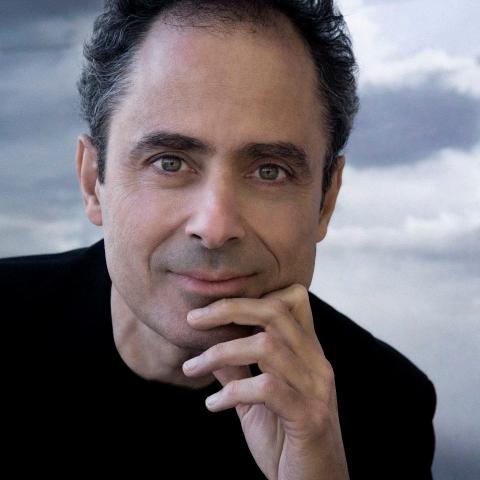

Eugene Drucker
Emerson String Quartet
Violinist Eugene Drucker, a founding member of the multiple Grammy Award-winning Emerson String Quartet, is also a soloist. He has appeared with the orchestras of Montreal, Brussels, Antwerp, Liège, Hartford, Richmond, Louisville, and Jerusalem, as well as with the American Symphony Orchestra, the Aspen Chamber Symphony and the Las Vegas Philharmonic. A graduate of Columbia University and the Juilliard School, where he studied with Oscar Shumsky, Mr. Drucker was concertmaster of the Juilliard Orchestra, with which he appeared as soloist several times. He made his New York debut as a Concert Artists Guild winner in the fall of 1976, after having won prizes at the Montreal Competition and the Queen Elisabeth Competition in Brussels. Mr. Drucker has recorded the complete unaccompanied works of Bach, reissued by Parnassus Records, and the complete sonatas and duos of Bartók for Biddulph Recordings.
His first novel, The Savior, was published by Simon & Schuster in 2007 and later appeared in a German translation called Wintersonate. A second novel, Yearning, was published in 2021. Mr. Drucker's suite for string quartet, Series of Twelve, was commissioned by the New Music for Strings Festival in Denmark. It was premiered in Copenhagen and Reykjavik in August 2018 and was later performed by the Escher Quartet in the U.S. He has also composed several settings of poetry by Shakespeare and Denise Levertov for voice and strings.
Eugene Drucker has taught at Stony Brook University since 2002, and recently joined the faculty of the Manhattan School of Music. He became Music Director of the Berkshire Bach Society’s "Bach at New Year’s” Concerts in 2017, and was appointed year-round Artistic Director for that organization in 2024. He lives in New York City with his wife, cellist Roberta Cooper.
Photo by Lisa-Marie Mazzucco
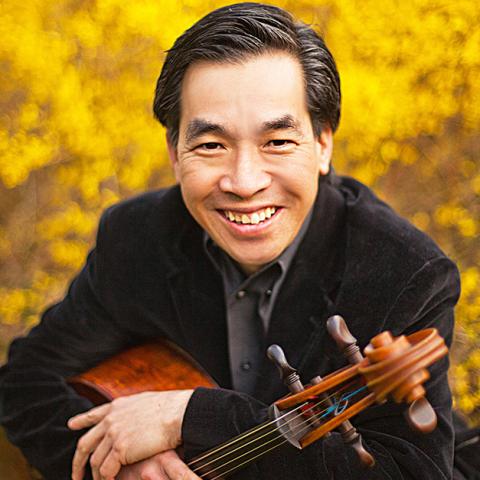

David Ying
Ying Quartet
David Ying is cellist of the Grammy award winning Ying Quartet. With the group he has performed widely throughout North America, and abroad, in traditional venues from Carnegie Hall to the Sydney Opera House. In addition, the quartet’s interest in making music a part of everyday life has led to performances in schools, hospitals, restaurants, correctional facilities and the White House. From its earliest years in a National Endowment for the Arts residency in Jesup, IA, the quartet has explored every opportunity to share music, and sought to communicate music’s expression of shared humanity.
The quartet also shares music through its recording activities. The Ying Quartet’s recording projects range from standard string quartet repertoire to its Lifemusic commissions to unusual collaborations with distinguished artists. Its recording of the Tchaikovsky Quartets is among its four Grammy nominations, and a collaboration with the Turtle Island Quartet won a Grammy. In addition three volumes of their LifeMusic commissions have received praise including an Editor’s Choice commendation from Gramophone magazine.
Apart from the Ying Quartet, David was a prizewinner in both the Naumburg International Cello competition and the Washington International Competition. In addition to performances with orchestra, he has played numerous recitals with pianist Elinor Freer, also his wife. Besides concertizing together, for ten years they also were artistic directors of the Skaneateles Festival. The Festival received an ASCAP award for adventurous programming as well as the Chamber Music America Acclaim award during these years. David is presently co-artistic director of the Bowdoin International Music Festival.
As a faculty member at the Eastman School of Music, David enjoys working with cellists and chamber music groups. His students and former students include members of orchestras such as the New York Philharmonic and the Utah Symphony, teachers, string quartet players, lawyers, and the cellist Alisa Weilerstein. David resides in Rochester NY, with Elinor and their children Alina and Nathaniel.
Photo by Kate Lemmon
Canadian Commission Composer
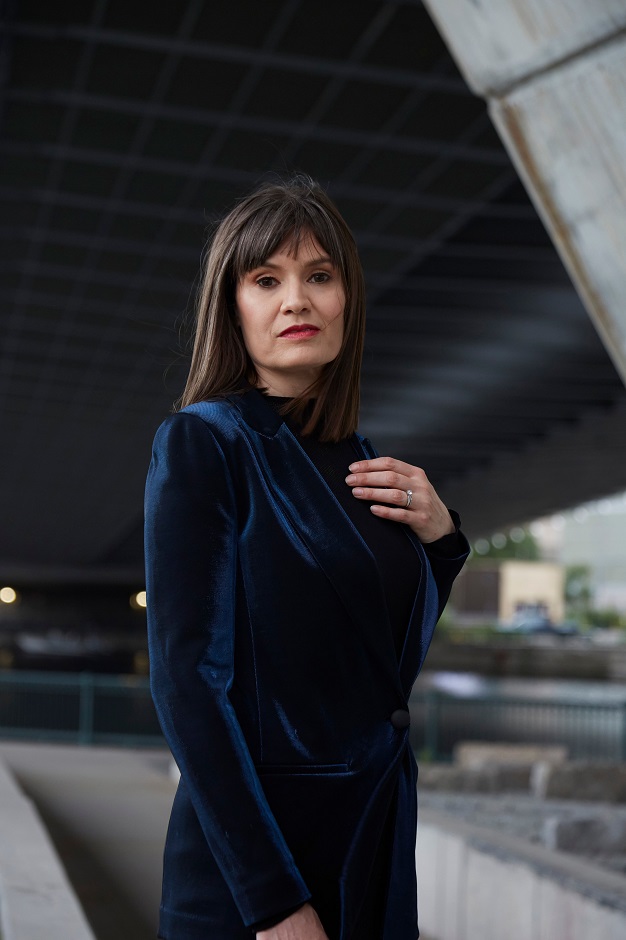
Photo by Robyn Twomney
Hailed as “a composer of imposing artistic gifts” (Gramophone Magazine) and “one of the brightest stars in her generation of composers” (Audiophile Audition), Kati Agócs writes “sublime music of fluidity and austere beauty” (The Boston Globe), that is “simmering, and lucid…and demands to be heard” (The New York Times). A recent Guggenheim Fellow, she is also a winner of the Arts and Letters Award, the lifetime achievement award in music composition from The American Academy of Arts and Letters, and a two-time nominee for Classical Composition of the Year in the Juno Awards. Kati Agócs is a citizen of Canada, the United States, and Hungary (European Union). She has served on the composition faculty at the New England Conservatory in Boston since 2008, and maintains a work studio in Flatrock, Newfoundland.
Recent works include a new, large-scale piece for soprano soloist, chorus, and orchestra, commissioned by the Jebediah Foundation; Transluminescence, her piano concerto for Nicolas Namoradze, commissioned by the Esther Honens International Piano Competition; her Horn Concerto for James Sommerville co-commissioned by a consortium of five U.S. and Canadian orchestras; and the cantata Voices of the Immaculate, written for Lucy Dhegrae and Third Sound Ensemble and co-commissioned by Miller Theatre at Columbia University, Chamber Music America, New Music USA, and the Philadelphia Chamber Music Society. The world premiere of Voices of the Immaculate took place as part of her Miller Theatre Composer Portrait in New York City. Zachary Woolfe wrote in The New York Times: “For once, singing of complete and utter clarity…a simmering new cantata, conceived with transparency as a first principle…entirely, word for word, lucid…her text demands to be heard, and is.”
Her music has been commissioned and performed by many other premier ensembles and organizations including the Vancouver Symphony Orchestra, Minnesota Orchestra, Boston Symphony Chamber Players, Toronto Symphony Orchestra, Ensemble Reconsil Vienna, Lontano, Albany Symphony Orchestra, National Youth Orchestra of Canada, Claremont Trio, Hub New Music, Jupiter String Quartet, Continuum, Da Capo Chamber Players, Ensemble Contemporain de Montreal, National Arts Centre Orchestra, and the multiple Grammy-award winning ensemble Eighth Blackbird, who toured the U.S. with Immutable Dreams. She contributed a work to violinist Jennifer Koh’s Grammy award- winning album “Alone Together.”
Other recent compositions include Imprimatur (String Quartet #2), commissioned by the Harvard Musical Association, Krannert Center/University of Illinois, and the Aspen Music Festival and School to open the Aspen Music Festival; Concerto for Violin and Percussion Orchestra, commissioned by the Fromm Music Foundation at Harvard University for the New England Conservatory Percussion Ensemble; Rogue Emoji for Hub New Music, commissioned by Ashmont Hill Chamber Music with support from The Cricket Foundation; Morning Star, a motet commissioned by Boston’s Emmanuel Music in celebration of their Fiftieth Anniversary; and The Debrecen Passion, a work for women’s chorus and orchestra with texts by Szilárd Borbély. Her album The Debrecen Passion with Lorelei Ensemble and the Boston Modern Orchestra Project was named one of its Top Ten Classical Albums of 2016 by The Boston Globe, with Gramophone Magazine calling the title track “an iridescent wonder.”
Residencies include the Charles Ives Music Festival, Chelsea Music Festival, Great Lakes Chamber Music Festival, Oberlin University, National Youth Orchestra of Canada (as Composer-in-Residence for their Fiftieth Anniversary) and a curatorial residency with Metropolis Ensemble in the Bowery on New York’s Lower East Side. Awards and honours include the Guggenheim Fellowship; the Arts and Letters Award, Charles Ives Fellowship and Charles Ives Scholarship from the American Academy of Arts and Letters; recording grants from the Aaron Copland Fund for Music; Composer fellowships from the Massachusetts Arts Council and the New York Foundation for the Arts; The Boston Foundation’s inaugural Brother Thomas Fellowship; the ASCAP Leonard Bernstein Fellowship at the Tanglewood Music Center; a Fulbright Fellowship to the Liszt Academy in Budapest; a Jacob K. Javits Fellowship from the U.S. Department of Education; residencies at the MacDowell Colony and Yaddo; and commissioning grants from the Canada Council for the Arts.
Born in Canada of Hungarian and American parents, Kati Agócs earned doctoral and Masters degrees from the Juilliard School, studying composition with Milton Babbitt, and studied voice privately with Adele Addison. She is an alumna of the Aspen Music School, Tanglewood Music Festival, Sarah Lawrence College, and Lester B. Pearson College of the Pacific (United World Colleges), where she represented the province of Ontario. Her works are published by Kati Agócs Music and distributed internationally by Theodore Front Musical Literature.
Mentor in Residence
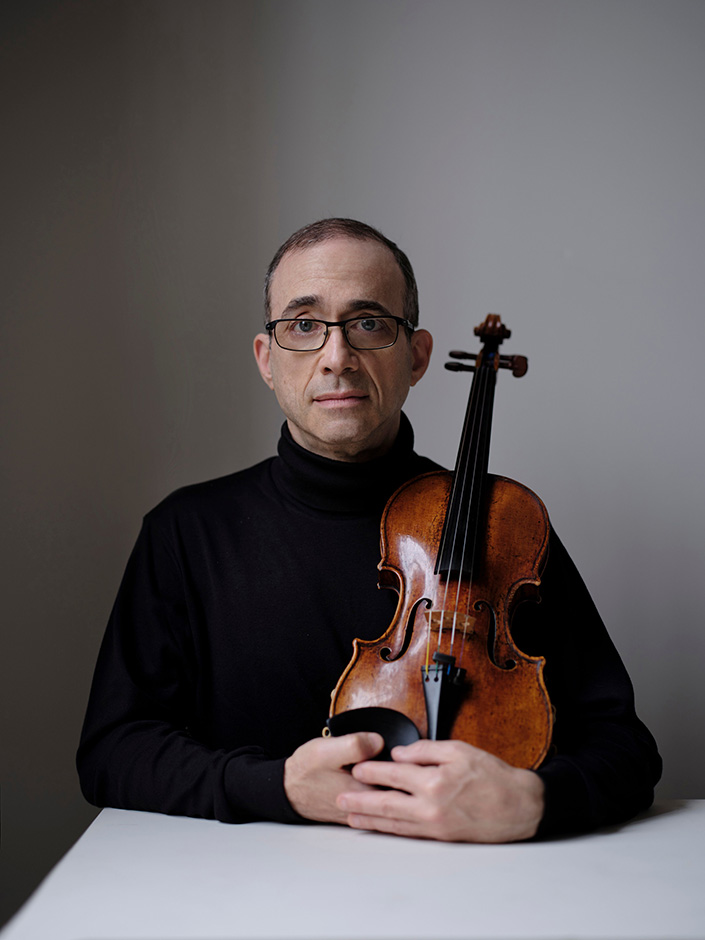
Photo by Jürgen Frank
Mark Steinberg is first violinist and founding member of the Brentano Quartet. With the quartet he has performed for thirty years on five continents. The quartet is ensemble in residence at Yale University, has recorded extensively, and has won awards such as the Naumburg Chamber Music Award, the inaugural Cleveland Quartet award and the Royal Philharmonic Society award for best debut in the UK. Steinberg has appeared often in trio and duo concerts with pianist Mitsuko Uchida, with whom he presented the complete Mozart sonata cycle in London's Wigmore Hall in 2001. Mr. Steinberg has been soloist with the London Philharmonia, the Los Angeles Philharmonic, the Auckland Philharmonia, and other orchestras. He holds degrees from Indiana University and The Juilliard School and has studied with Louise Behrend, Josef Gingold, and Robert Mann. He is currently on the violin faculties of the Manhattan School of Music, and The Graduate Center at CUNY. Steinberg has been on quartet competition juries at the Banff International Quartet Competition, the London Quartet Competition, and twice at the Mozart International Quartet Competition in Salzburg as well as the Naumburg Violin and Chamber Music Competitions. He has taught often at the Banff Centre for the Arts, the Aspen Festival, Norfolk Chamber Music Festival, the Steans Institute at Ravinia, and the Taos School of Music and has given master classes at Rice University, the Eastman School of Music, the Cleveland Institute of Music, the Britten-Pears Institute in Aldeburgh, England, the Mozarteum in Salzburg, the Guildhall School, the Amsterdam Conservatory, and numerous other schools.
Mentor in Residence Program supported in honour of the R.S. Williams & Sons Company.
Many competitions exist for chamber music, but no competition is as prestigious for string quartets exclusively as Banff. Having served on the jury twice—once in the preliminary screening round and once for the live auditions in Banff—I can say, without any doubt, that the judging was honest and transparent. The Banff Competition has certainly helped launch the careers of many deserving young string quartets.
Philip Setzer, Emerson String Quartet
For questions please contact:
Email: bisqc@banffcentre.ca
Phone: 403.762.6231
107 Tunnel Mountain Drive
Box 1020, Stn. 23 Banff, Alberta
T1L 1H5 Canada


